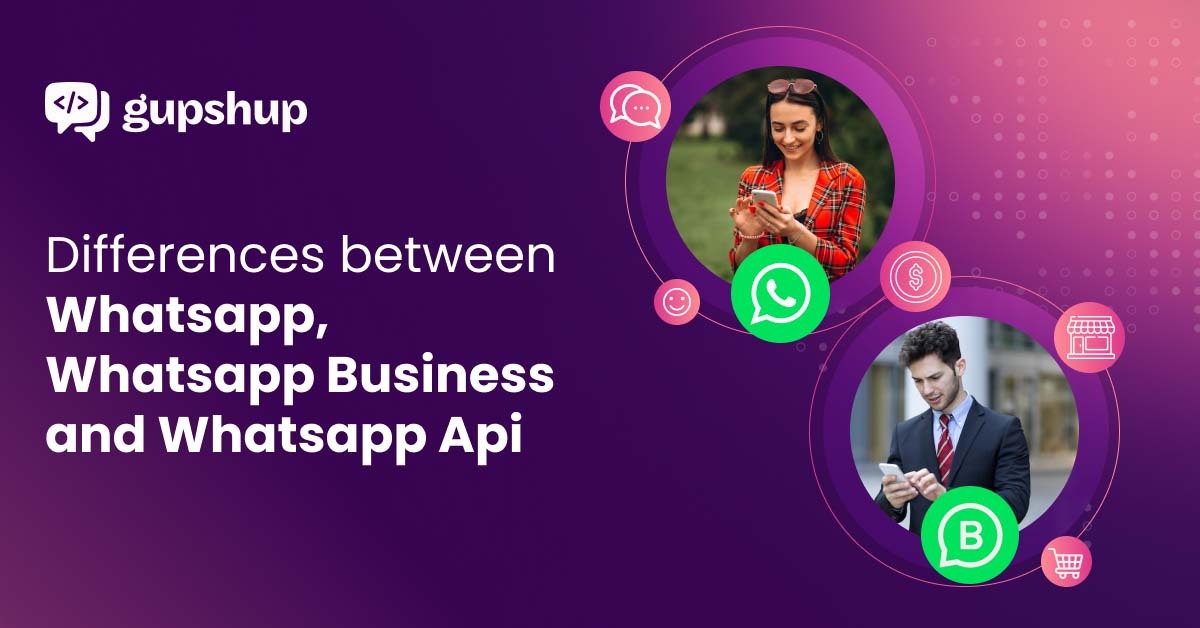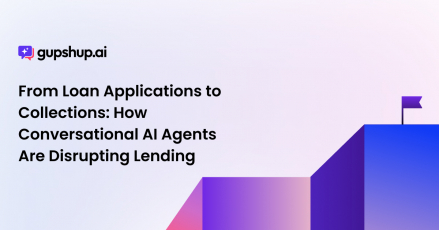What is the Difference Between WhatsApp, WhatsApp Business, and WhatsApp API?

What if the way you’re using WhatsApp for business is only scratching the surface?
Here’s the thing: WhatsApp is great for personal messaging, but when it comes to running a business, it’s everything that you can ask for.
WhatsApp Business steps it up with tools like business profiles, labels, and quick replies—perfect for small businesses that need basic functionality. But when your business starts growing, managing those customer conversations becomes a challenge. That’s where the WhatsApp Business API shines.
Unlike the app, the WhatsApp Business API is built for scale. It automates chats, integrates with CRMs, and even uses AI-powered bots to handle thousands of customer interactions at once. Imagine sending personalized order updates, handling customer service requests, and automating marketing campaigns all in one place. It’s a game-changer for businesses that want to scale communication without losing the personal touch.
If you’ve been wondering whether it’s time to level up your customer communication, this guide will break down the key distinctions between WhatsApp Messenger, WhatsApp Business, and the WhatsApp Business API, helping you decide which one is right for your business. Let’s dive right in.

WhatsApp vs WhatsApp Business vs WhatsApp Business API: An Overview

Before we dive into what differentiates each of these platforms, it is necessary to understand and do an in-depth analysis of each of them, and choosing between these options depends on your business needs.
WhatsApp (WhatsApp Messenger)
WhatsApp Messenger is designed for personal use, offering simple, secure, and user-friendly messaging for over 2 billion people worldwide. It allows text, voice, and video communication but lacks features tailored to business needs. Individuals use it to stay in touch with family and friends, but its limited scalability makes it impractical for businesses that handle large customer inquiries.
WhatsApp Business
WhatsApp Business is a step-up aimed at small and medium-sized businesses (SMBs). It includes additional features (a few more than WhatsApp Messenger) that make customer interactions more efficient. It enables businesses to reach and engage with WhatsApp’s active user base, which consists of over 2 billion users globally who frequently use the app for personal and business communication.
WhatsApp Business API
The WhatsApp Business API is built for larger enterprises with higher customer interaction volumes. Unlike the app versions, the API doesn’t have a standalone interface. Instead, businesses integrate it with CRM systems, which allows for automated customer interactions at scale. This setup enables businesses to interact with users on a platform they already trust and use daily, giving the customers a seamless experience.
Understanding WhatsApp Messenger: The Basics of Personal Use

WhatsApp Messenger is one of the most widely used messaging platforms globally, with over 2.5 billion users as of 2023. It was initially launched in February 2009 with the goal of providing simple, internet-based messaging, and it quickly became popular due to its ease of use, cost efficiency (allowing users to bypass traditional SMS charges), and global reach.
WhatsApp Messenger offers features like:
- Text messaging: This core function allows you to send messages over an internet connection instead of using traditional SMS.
- Voice and video calls: WhatsApp allows both voice and video calls, even in areas with poor signal quality, making it a global favorite for personal communication.
- Media sharing: Users can easily share photos, videos, documents, and locations with their contacts. It supports sending files up to 2GB in size.
- End-to-end encryption: WhatsApp ensures that all your messages and calls are secure, meaning only you and the recipient can access their content, not even WhatsApp itself.
While WhatsApp Messenger is an excellent tool for keeping in touch with friends and family, its lack of business-specific features limits its use for professional communication. This is where we bring in WhatsApp Business.
How WhatsApp Business Boosts Small Businesses?

For smaller businesses, the WhatsApp Business App is an excellent place to start. It comes with useful features like business profiles, quick replies, and automated messages that make handling customer inquiries much easier. You can even create personalised experiences by setting up product catalogs and automating responses so no customer query goes unanswered—even after hours. These tools help you stay responsive and keep customers engaged.
At its core, WhatsApp Business provides:
- Quick replies: Pre-saved messages to answer frequently asked questions instantly.
- Automatic messages: Greeting or away messages to maintain engagement even when a business is offline.
- Media messages: Sending images, videos, or documents to provide a richer customer experience.
- Outbound notifications: Proactive alerts like order confirmations or reminders.
- Chatbots: AI-driven tools to automate responses and handle customer queries at scale.
- Interactive messages: Advanced features like buttons for quick responses and carousel-style messaging for an enhanced shopping experience.
With its growing integration into conversational commerce, WhatsApp Business enables not just support but also e-commerce, consultations, and even bookings directly through chats. In fact, according to research by Meta, 75% of customers who message a business on platforms like WhatsApp end up making a purchase.
Limitations of WhatsApp Business
The WhatsApp Business app is a great, free tool, but as your business grows, you might start noticing a few limitations that could get in the way of scalability and efficiency. Here are some of the key challenges:
1. Single-user access
One of the biggest drawbacks is that the WhatsApp Business app is designed primarily for a single user. You can only connect it to one mobile phone number, and although it lets you link up to four additional devices like desktops or laptops, only one mobile device can be active at a time. This can quickly become an issue for businesses with multiple team members needing to manage customer inquiries simultaneously. If you’re looking for more flexibility, upgrading to the WhatsApp API or exploring the best WhatsApp Business API service might be a better fit.
2. Limited Scalability
While the app works well for small-scale customer interactions, it struggles to handle high volumes of messages. As your customer base grows, managing the increasing number of inquiries on the app can become overwhelming. For businesses that need to handle larger volumes of customer communication efficiently, the WhatsApp Business API offers much more scalability. The WhatsApp API can integrate with other systems and automate processes, making it ideal for businesses that expect to scale over time.
3. Lack of Advanced Features
The app comes with some useful basic features like automated responses, quick replies, and business profiles, but it lacks more advanced functionality. For example, there’s no support for team collaboration, CRM integrations, or AI-powered chatbots—features that are essential for businesses wanting more in-depth customer management. If you’re looking for tools like custom workflows, chatbot automation, or detailed analytics, you’ll need to move beyond the free app and look into WhatsApp bot solutions or other services that work with the WhatsApp Business API.
The Power of WhatsApp Business API

If you’re dealing with a larger customer base or looking to scale, it’s worth considering the WhatsApp Business API. The WhatsApp API is designed for businesses that need more advanced solutions, like CRM integration, to provide a unified, streamlined customer experience. With AI-driven WhatsApp bots, multi-agent support, and rich media messaging, you can automate repetitive tasks while delivering personalised service. This way, you can manage thousands of customer interactions without losing that personal touch.
Let’s take AECC Global, for example. AECC Global, an education consultancy, sought to enhance its customer reach and engagement with prospective students. By leveraging the WhatsApp Business API through Gupshup, they integrated chatbots for streamlined communication. This automation allowed AECC Global to provide timely responses and information to over 500+ students, reducing manual effort. The result was a 6x increase in reach and a substantial boost in message open rates, from 10% to 70%. This improved engagement helped AECC Global connect with more students effectively, driving growth and satisfaction.
Key Features of WhatsApp Business API:
- Unlimited users and devices: Unlike the WhatsApp Business app, the API supports unlimited users and devices, allowing teams to collaborate seamlessly on customer support with 1,000 unique daily contacts by default, scalable with increased interaction.
- Verified business accounts: Gain a green checkmark for credibility. Verified businesses can use a display name and enjoy higher messaging limits, instilling trust with customers.
- CRM Integration: The API integrates with CRM systems, streamlining contact management and ensuring seamless, compliant customer interaction through opt-ins.
- Automation and chatbots: Automate responses with WhatsApp bots and Flows, handling tasks like onboarding, support, or reminders, reducing manual effort and improving efficiency.
Key Benefits of WhatsApp for Businesses

The WhatsApp Business API is a powerful tool for businesses aiming to scale customer interactions efficiently while maintaining personalization through AI. Here are its key benefits:
- AI-Powered Automation: The API enables businesses to automate responses with chatbots, manage large-scale conversations, and integrate sentiment analysis to escalate sensitive queries to live agents.
- Hosting Bot Journeys: Customizable chatbots can guide customers through processes such as bookings, product purchases, and support, reducing human effort and improving customer satisfaction.
- Rich Media Messaging: Businesses can share multimedia elements like images, videos, and interactive buttons for a more engaging user experience, speeding up customer interactions by 3x.
- Full-Funnel CX: AI enhances the customer journey at every stage, from lead generation to post-purchase support, ensuring a personalized and seamless experience.
- Multi-Campaign Capabilities: Businesses can run simultaneous, AI-driven campaigns that segment audiences, tailor content, and retarget for higher conversions.
- Click-to-WhatsApp Ads (CTWA): Integrated with Facebook and Instagram ads, CTWA enables instant customer conversations, increasing lead generation and conversion rates.
- Omnichannel Integration: The API supports seamless integration with CRM systems, email, and other communication platforms, offering a unified experience across all customer touchpoints.
- Multi-Language Support: AI-powered multilingual capabilities enable businesses to serve global customers in their preferred languages.
How to Choose the Best Option for Your Business?

Here is a list of the features of the WhatsApp business app and the WhatsApp Business API. With clear differentiation, you will be able to choose the best option for your business.

Take Control of Your WhatsApp Presence to Wow Your Customers
If you want to take control of your WhatsApp presence and truly wow your customers, choosing the right solution is essential for maximizing engagement. Whether you’re a small business or a growing enterprise, WhatsApp offers powerful tools to boost customer interactions, build trust, and deliver a seamless experience.
At the end of the day, choosing between the WhatsApp Business App and the WhatsApp Business API depends on the size of your business and your long-term goals. For small operations, the app is a great way to get started. But for companies ready to scale and take customer engagement to the next level, finding the best WhatsApp Business API service can make a world of difference. With the right tools in place, you can provide real-time support, personalized experiences, and secure communication that will help you build long-lasting customer relationships.
With Gupshup’s solutions, businesses can tap into advanced WhatsApp features like chatbots and multi-agent support while maintaining a seamless connection across channels. Build real-time, personalized interactions that can take your business to the next level, ensuring customer satisfaction and efficiency.
FAQ
1. Which is better, WhatsApp or WhatsApp Business?
WhatsApp is designed for personal use, allowing individual messaging, calls, and media sharing. WhatsApp Business adds professional features like business profiles, automated replies, and labels, making it better for small businesses to communicate with customers. The right choice depends on your needs—personal or business use.
2. Can I use WhatsApp Business as normal WhatsApp?
Yes, you can use WhatsApp Business like normal WhatsApp to chat with friends and family. However, it also comes with additional business tools, such as automated messages and business profiles, which set it apart from the regular app.
3. What are the disadvantages of WhatsApp Business account?
The main disadvantages of WhatsApp Business are its limited scalability—it’s designed for small teams with single-user access—and the lack of advanced analytics or integration options compared to WhatsApp Business API, which is built for larger enterprises.
Here are insightful resources on leveraging WhatsApp Business for various markets and use cases:
- WhatsApp for Business: A Complete Guide
- WhatsApp Business Enterprise: Scale Your Customer Interactions
- The Business of WhatsApp in Brazil
- WhatsApp for Business in India: Opportunities for Growth
- WhatsApp Business Pricing: Everything You Need to Know
- All You Need to Know About WhatsApp Business API Price Change 2023




